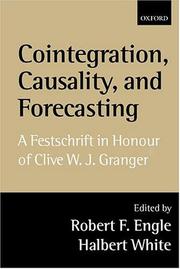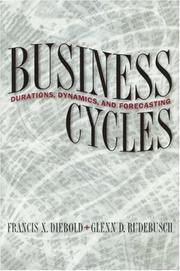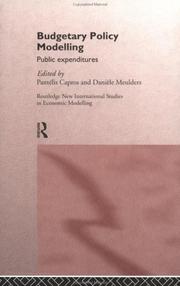| Listing 1 - 4 of 4 |
Sort by
|
Book
Year: 2017 Publisher: Washington, D.C. : The World Bank,
Abstract | Keywords | Export | Availability | Bookmark
 Loading...
Loading...Choose an application
- Reference Manager
- EndNote
- RefWorks (Direct export to RefWorks)
This paper examines the causal relationship between energy efficiency and economic growth based on panel data for 56 high- and middle-income countries from 1978 to 2012. Using a panel vector autoregression approach, the study finds evidence of a long-run Granger causality from economic growth to lower energy intensity for all countries. The study also finds evidence of long-run bidirectional causality between lower energy intensity and higher economic growth for middle-income countries. This finding suggests that beyond climate benefits, middle-income countries may also earn an extra growth dividend from energy efficiency measures.
Economic Growth --- Energy Efficiency --- Energy Intensity --- Granger Causality --- Panel Cointegration --- Vector Autoregressions

ISBN: 0198296835 9780198296836 Year: 1999 Publisher: Oxford Oxford University Press
Abstract | Keywords | Export | Availability | Bookmark
 Loading...
Loading...Choose an application
- Reference Manager
- EndNote
- RefWorks (Direct export to RefWorks)
Quantitative methods (economics) --- Econometrics --- Econometric models --- Cointegration --- Business forecasting --- Granger, Clive William John --- AA / International- internationaal --- 305.970 --- 305.973 --- 304.5 --- Algemeenheden: Autoregression and moving average representation. ARIMA. ARMAX. Lagrange multiplier. Wald. Function (mis) specification. Autocorrelation. Homoscedasticity. Heteroscedasticity. ARCH. GARCH. Integration and co-integration. Unit roots. --- Causaliteitsanalyse. --- Techniek van de statistische-econometrische voorspellingen. Prognose in de econometrie. --- Economics, Mathematical --- Statistics --- Mathematical models --- Business --- Business forecasts --- Forecasting, Business --- Economic forecasting --- Techniek van de statistische-econometrische voorspellingen. Prognose in de econometrie --- Algemeenheden: Autoregression and moving average representation. ARIMA. ARMAX. Lagrange multiplier. Wald. Function (mis) specification. Autocorrelation. Homoscedasticity. Heteroscedasticity. ARCH. GARCH. Integration and co-integration. Unit roots --- Causaliteitsanalyse --- Forecasting --- Granger, C. W. J. --- Granger, Clive William John, --- Business forecasting - Econometric models

ISBN: 0691012180 9780691012186 Year: 1999 Publisher: Princeton (N.J.) Princeton university press
Abstract | Keywords | Export | Availability | Bookmark
 Loading...
Loading...Choose an application
- Reference Manager
- EndNote
- RefWorks (Direct export to RefWorks)
This is the most sophisticated and up-to-date econometric analysis of business cycles now available. Francis Diebold and Glenn Rudebusch have long been acknowledged as leading experts on business cycles. And here they present a highly integrative collection of their most important essays on the subject, along with a detailed introduction that draws together the book's principal themes and findings. Diebold and Rudebusch use the latest quantitative methods to address five principal questions about the measurement, modeling, and forecasting of business cycles. They ask whether business cycles have become more moderate in the postwar period, concluding that recessions have, in fact, been shorter and shallower. They consider whether economic expansions and contractions tend to die of "old age." Contrary to popular wisdom, they find little evidence that expansions become more fragile the longer they last, although they do find that contractions are increasingly likely to end as they age. The authors discuss the defining characteristics of business cycles, focusing on how economic variables move together and on the timing of the slow alternation between expansions and contractions. They explore the difficulties of distinguishing between long-term trends in the economy and cyclical fluctuations. And they examine how business cycles can be forecast, looking in particular at how to predict turning points in cycles, rather than merely the level of future economic activity. They show here that the index of leading economic indicators is a poor predictor of future economic activity, and consider what we can learn from other indicators, such as financial variables. Throughout, the authors make use of a variety of advanced econometric techniques, including nonparametric analysis, fractional integration, and regime-switching models. Business Cycles is crucial reading for policymakers, bankers, and business executives.
Prevision commerciale --- Cycles economiques --- Business forecasting --- Business cycles --- Methodes statistiques. --- Statistical methods. --- Andrews, Donald W. K. --- Balke, Nathan S. --- Blanchard, Olivier J. --- Brier, G. W. --- Burns, Arthur F. --- Campbell, John Y. --- Deaton, Angus. --- Diebold, Francis X. --- Eichenbaum, M. --- Filardo, Andrew J. --- Gordon, Robert J. --- Granger-Sims causality. --- Hamilton, James D. --- Kim, Chang-Jin. --- Mankiw, N. Gregory. --- Mitchell, Wesley C. --- Nelson, Charles R. --- Plosser, Charles I. --- Rudebusch, Glenn D. --- Savin, N. Eugene. --- Shapiro-Wilk test. --- Watson, Mark W. --- Wilcoxon test. --- business cycle: causes of. --- consumption. --- hazard function. --- linear models. --- mean-unbiased estimation. --- sequential probability rule (SPR). --- trends and unit roots. --- unit root tests. --- volatility: analysis. --- Statistical methods

ISBN: 0415142350 9786610242108 113476605X 1280242108 0203979370 1134766041 Year: 2005 Publisher: London ; New York : Routledge,
Abstract | Keywords | Export | Availability | Bookmark
 Loading...
Loading...Choose an application
- Reference Manager
- EndNote
- RefWorks (Direct export to RefWorks)
The focus of this volume is on the European context of public budget policy and a variety of different approaches are used - theoretical modelling, econometrics and applied general equilibrium modelling. Empirical evidence and case studies of European countries are contained in all the papers. The papers cover the four general themes of public budget policy: * economic stabilization, in view of the Economic and Monetary Union in the European Community * reinforcing structural change, involved in market liberalization and harmonization of economic structures * its distributional
Public finance --- Budget --- Government spending policy --- Dépenses publiques --- Politique gouvernementale --- European Union countries --- Pays de l'Union européenne --- Appropriations and expenditures --- Crédits budgétaires et dépenses --- AA / International- internationaal --- DE / Germany - Duitsland - Allemagne --- GR / Greece - Griekenland - Grèce --- IT / Italy - Italië - Italie --- PT / Portugal --- 336.61 --- 336.401 --- Financieel beleid. --- Verband tussen begrotingspolitiek en economische evolutie. --- Dépenses publiques --- Pays de l'Union européenne --- Crédits budgétaires et dépenses --- Expenditures, Public --- Public spending policy --- Spending policy, Government --- Economic policy --- Finance, Public --- Full employment policies --- Unfunded mandates --- Budgeting --- Econometric models --- Verband tussen begrotingspolitiek en economische evolutie --- Financieel beleid --- Government policy --- Forecasting --- EU countries --- Euroland --- Europe --- co-integration --- regressions --- real --- interest --- rate --- vectors --- public --- deficit --- granger --- causality
| Listing 1 - 4 of 4 |
Sort by
|

 Search
Search Feedback
Feedback About UniCat
About UniCat  Help
Help News
News